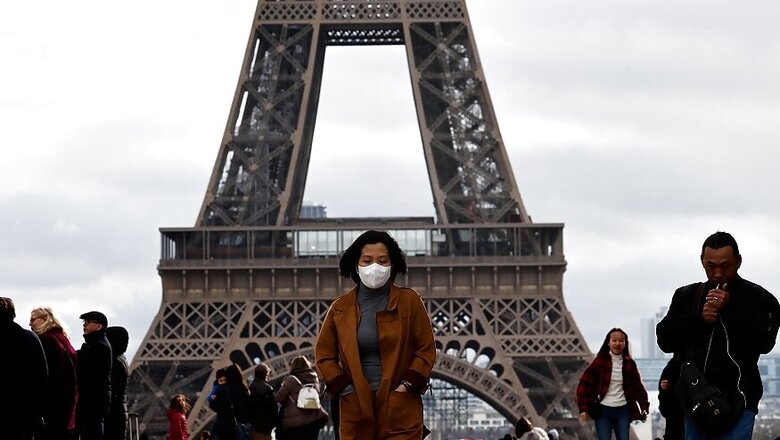
views
France's economy is expected to shrink by a worse-than-expected eight percent this year after President Emmanuel Macron extended a coronavirus lockdown until May 11, though officials cautioned Tuesday than any lifting of the stay-at-home orders would be gradual at best.
Finance Minister Bruno Le Maire had previously targeted a six-percent GDP drop for the year, but that was based on a lockdown that lasted just one month, instead of the two-month period announced by Macron in a televised address Monday night.
Le Maire told BFM television that given the uncertain outlook for economies across the globe, not least in the United States and Asia, "these forecasts need to be considered with caution."
The massive relief effort for bars, restaurants, hotel, shops and other businesses closed during the lockdown will push France's budget deficit up to nine percent of GDP this year, Budget Minister Gerald Darmanin said separately in an interview with France Info radio.
"Each day, each week of confinement... is worsening our public finances," he said, adding that France's debt pile would soar to 115 percent of GDP, up from just under 100 percent last year.
Both forecasts are well above the limits set by the EU's Stability and Growth Pact, which calls for deficits to be capped at three percent of GDP, and a debt-to-GDP ratio of no more than 60 percent.
But EU officials have already signalled the rules will be suspended as governments scramble to contain the economic fallout and prevent mass bankruptcies and layoffs.
Le Maire said government aid for small companies at risk of going under after losing at least 50 percent of their revenues, would be raised to as much as 5,000 euros ($5,470) from 1,500 euros previously.
The total amount of this solidarity fund would now reach seven billion euros, he said, and some 900,000 businesses have already applied for the aid.
- 'Still have to combat this' -
Macron also warned that easing of the lockdown in place since March 17 would depend on a continuation of declines in COVID-19 death rates and hospitalisations, especially the number of people needing intensive care.
France reported 574 new daily deaths Monday, bringing the total to nearly 15,000, but the number of people in serious condition fell for the fifth day in a row, with 24 fewer people.
But even after May 11, officials say many of the confinement rules will remain in place with most bars, restaurants and cinemas still closed, even if some schools and shops are allowed to reopen.
"May 11 is a date we will have to win by respecting the confinement rules," Interior Minister Christophe Castaner told France Inter radio.
"You cannot think that on May 12 we can say, 'It's May, we can do what we want.' We will still have to combat this," he said.
He also advised against planning any summer vacations outside Europe, after Macron said borders with non-European nations would remain closed until further notice.
Education Minister Jean-Michel Blanquer, meanwhile, said parents should not imagine that classes will resume as usual if the lockdown restrictions are eased.
"All schools are not going to open on May 11," he told France 2 television, noting that the aim is to ensure children at risk of dropping out and those in low-income households with limited access to parental help or internet access would be among the first back at their desks.
"In May and June, things are not going to be back to normal," he said, adding that students may be spaced farther apart from each other in class, and schooldays could be shortened.
Blanquer added that officials had not yet decided if face masks will be made available to teachers and students, though it was "highly possible".




















Comments
0 comment